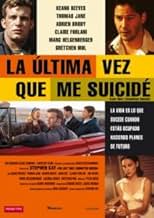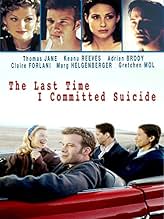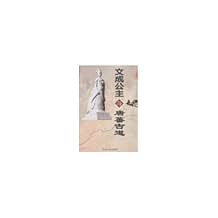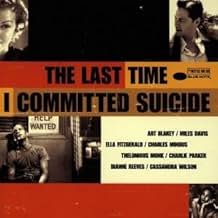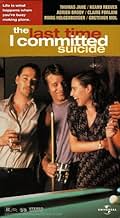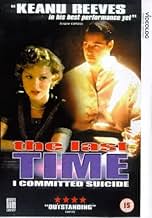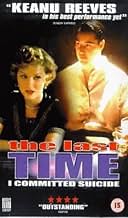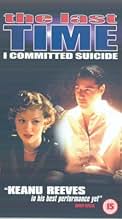L'ultima volta che mi sono suicidato
Titolo originale: The Last Time I Committed Suicide
VALUTAZIONE IMDb
5,4/10
2545
LA TUA VALUTAZIONE
Aggiungi una trama nella tua linguaIn 1946 Denver, an aspiring writer who enjoys irresponsible adventures with his friend writes a letter about his life before and after the suicide attempt by his sad, commitment-seeking girl... Leggi tuttoIn 1946 Denver, an aspiring writer who enjoys irresponsible adventures with his friend writes a letter about his life before and after the suicide attempt by his sad, commitment-seeking girlfriend.In 1946 Denver, an aspiring writer who enjoys irresponsible adventures with his friend writes a letter about his life before and after the suicide attempt by his sad, commitment-seeking girlfriend.
Cristine Rose
- Mrs. Greenway
- (as Christine Rose)
Recensioni in evidenza
Seeing this film for the first time is like being introduced to that friend or lover you always dreamed about. Neal Cassady, the hero of Jack Kerouac's On The Road and Visions Of Cody, comes to life on the screen, having the same effect as James Dean used to; as the old cliche goes: women want him, men want to be him. Taken from a letter Cassady wrote to good ol' Jack, the story meanders around the lives of Cassady, his pool hall boozer friend Harry, and his lovely but melancholy girlfriend Joan (played exquisitely by Claire Forlani, who is in my humble opinion one of the most beautiful and gifted people working in Hollywood today). So, not to give too much of the plot away, Neal manages to have his decisions made for him; whether this is by fate or by his own personality is left up to the viewer. Stephen Kay follows Cassady and recreates a legend before our eyes. And whoever discovered Thomas Jane deserves a big ol' kiss. The film delivers, and the spirit of the Beats once again is given a voice and, as it were, an image.
To appreciate this film the viewer needs either to be in a jazzy, rebellious sort of mood, or have some interest in Neal Cassady, an American who figured heavily in the development of the "beat generation" of the 1950s.
Set in the 1940s during one notable period of Cassady's life, the film is mostly a character study of Cassady (Thomas Jane), and his relationship with other people in his life, including his friend Harry (Keanu Reeves) and various romantic interests, the central one being Joan (Claire Forlani).
But Cassady was a quirky kind of guy, a rebel, a nonconformist, fun loving, with a restless energy, a person constantly on the move, both physically and philosophically. As presented in the film, he is a cross between James Dean and Jim Morrison.
Cassady's offbeat personality is mirrored in the film's offbeat style. It's shot partly in color and partly in B&W. Plot structure seems deliberately chaotic, frenetic, loose. Jump cuts can be jarring for viewers expecting a smoothly flowing, linear plot. And the tone alternates between silly and philosophical. Background music is mostly jazz with some blues thrown in. Accordingly, a lot of viewers will find the film's unorthodox style off-putting.
But I liked it, for the most part. The plot would have been stronger if it had focused on Cassady's 1950s relationship with other historical figures, like Jack Kerouac and Allen Ginsberg, instead of his romances with random women. Otherwise, the cinematography, the music, and the performance of Thomas Jane are terrific.
Set in the 1940s during one notable period of Cassady's life, the film is mostly a character study of Cassady (Thomas Jane), and his relationship with other people in his life, including his friend Harry (Keanu Reeves) and various romantic interests, the central one being Joan (Claire Forlani).
But Cassady was a quirky kind of guy, a rebel, a nonconformist, fun loving, with a restless energy, a person constantly on the move, both physically and philosophically. As presented in the film, he is a cross between James Dean and Jim Morrison.
Cassady's offbeat personality is mirrored in the film's offbeat style. It's shot partly in color and partly in B&W. Plot structure seems deliberately chaotic, frenetic, loose. Jump cuts can be jarring for viewers expecting a smoothly flowing, linear plot. And the tone alternates between silly and philosophical. Background music is mostly jazz with some blues thrown in. Accordingly, a lot of viewers will find the film's unorthodox style off-putting.
But I liked it, for the most part. The plot would have been stronger if it had focused on Cassady's 1950s relationship with other historical figures, like Jack Kerouac and Allen Ginsberg, instead of his romances with random women. Otherwise, the cinematography, the music, and the performance of Thomas Jane are terrific.
"this was not the last time I committed suicide..." That's such an amazing line. It's all about how you make certain choices that could make the world of difference in your future, how the road you have just chosen to take might not be the one that you most want -- but for some reason you take it anyways. That by one choice, you are killing a life that you might've had. It's a great movie! And the ending is wonderful! It's so bittersweet, so honest. It makes me wish that things were as easy as they were then. That like Neal Cassady, I could just drop everything, hop into a stolen car, and ride away --- doesn't matter where, just away.
The best thing about this movie is the opening scene, where Neal Cassady is doing more daydreaming and dancing then he is working on his writing. The beginning of the movie screams to Cassady's life, and shows the audience a Marlon Brando type character that had strong ties with folks like, Allen Ginsberg and Jake Kerouac. Cassady, a forgotten literary figure with more passion for creativity then progress in writing, would later become the character to drive the bus in Ken Kesey's, The Electric Kool-Aid Acid Test. It is important to note, that while Cassady had only one decent literary publication, his zealous outlook on life was borrowed by some of the "great literary beat writers" in America.
The Actor Keanu Reeves, who I have never been a huge fan of, does an excellent job of shedding light on Cassady's constant dissonance about leaving the life of a beat writer, for the life of a 9-5 working man with a stable house, beautiful wife, and loving family.
The movie overall, is about this dissonance, is about the passion that Cassady had for both the creative life and the more stable environment of the family life. Sadly, Cassady was unable to find balance between the two.
Do not expect, watching this movie that it will touch your life with a "wow-effect" forever. It is not some type of magical-beat-generation-movie that you can philosophize about for hours, it is just a pretty good movie.
What you can keep with you forever, however, is the soundtrack to this movie, The Last Time I Committed Suicide. With scores of music from folks like, Miles Davis, Dizzy Gillespie, Thelonious Monk, Tyler Bates, Ella Fitzgerald and Charles Mingus, this soundtrack is sure visit any jazz lovers CD player often.
The Actor Keanu Reeves, who I have never been a huge fan of, does an excellent job of shedding light on Cassady's constant dissonance about leaving the life of a beat writer, for the life of a 9-5 working man with a stable house, beautiful wife, and loving family.
The movie overall, is about this dissonance, is about the passion that Cassady had for both the creative life and the more stable environment of the family life. Sadly, Cassady was unable to find balance between the two.
Do not expect, watching this movie that it will touch your life with a "wow-effect" forever. It is not some type of magical-beat-generation-movie that you can philosophize about for hours, it is just a pretty good movie.
What you can keep with you forever, however, is the soundtrack to this movie, The Last Time I Committed Suicide. With scores of music from folks like, Miles Davis, Dizzy Gillespie, Thelonious Monk, Tyler Bates, Ella Fitzgerald and Charles Mingus, this soundtrack is sure visit any jazz lovers CD player often.
To clear up any misconceptions, it's based on the Cherry Mary letter to Kerouac(not Ginsberg) and the Reeves character isn't supposed to be Kerouac, he's supposed to be one of Cassady's old Denver pool hall buddies. If you recall the beginning of the movie, Cassady is writing this story to Kerouac(it's the letter, get it?) why would he be telling Kerouac a story that Kerouac was such a big part of? Plus, Kerouac, though he liked to drink, wasn't like that at all.
Although I do believe that Benjamin is based on Ginsberg. Even though the nameless guy from the letter that he represents wasn't Ginsberg, I think Kay took the opportunity of a blank-slate character to make a Ginsberg character(I base this on the attitude of the character, the obvious crush he has on Cassady, and the race car story that Cassady tells him which is a story Cassady told Ginsberg orally in reality that Ginsberg jotted down and that you can find in Cassady's book, The First Third), which is a great idea. Except that Adrian Brody stands firmly as my least favorite Allen Ginsberg portrayal of all time. He did not capture Ginsberg's brand of warmth and sweetness even slightly. The writing cannot be blamed for how annoying Brody played him. See the Ginsberg portrayals in Naked Lunch and I'm Not There for very good Ginsbergs by Michael Zelniker and David Cross.
What makes up for Adrian Brody's Ginsberg is Tom Jane's Cassady which is spot on. The way he spoke and moved was perfect. Just short of watching Cassady himself. It was strange to see such good acting and such bad acting right next to each other.
Unlike Naked Lunch(Which I think anybody who likes a good movie can easily enjoy) I understand how anyone who doesn't know and like the Beats wouldn't really dig this movie. However it was a lot of fun for me to watch and it will be the next time I watch it too.
I don't know if anyone noticed, but in addition to all the lines taken from the letter it's based on, there was lines taken from other stuff Cassady wrote too! Like I said, the race car story he tells Benjamin is a story he told Allen and there is the best line from one of my favorite Cassady/Ginsberg letters: "I see no greatness in myself--I even have no conception of what is greatness. I am a simple-minded, child-like, insipid sort of moronic kind of awkward-feeling adolescent." which is not quoted directly in the movie, as it is in this here review, but it's in there! And I believe the Adventures in Auto Eroticism story is in there too? Probably other stuff I'm forgetting. Anyway, Stephen Kay clearly knows his stuff when it comes to these guys and I don't think the script lacked wit at all, I thought it was natural, especially considering how many of the lines were quotes, I think he mixed them pretty well into his own writing(Although I wouldn't say quite as well a Cronenberg did in Naked Lunch). Also check out Tom Jane in Arrested Development!
Although I do believe that Benjamin is based on Ginsberg. Even though the nameless guy from the letter that he represents wasn't Ginsberg, I think Kay took the opportunity of a blank-slate character to make a Ginsberg character(I base this on the attitude of the character, the obvious crush he has on Cassady, and the race car story that Cassady tells him which is a story Cassady told Ginsberg orally in reality that Ginsberg jotted down and that you can find in Cassady's book, The First Third), which is a great idea. Except that Adrian Brody stands firmly as my least favorite Allen Ginsberg portrayal of all time. He did not capture Ginsberg's brand of warmth and sweetness even slightly. The writing cannot be blamed for how annoying Brody played him. See the Ginsberg portrayals in Naked Lunch and I'm Not There for very good Ginsbergs by Michael Zelniker and David Cross.
What makes up for Adrian Brody's Ginsberg is Tom Jane's Cassady which is spot on. The way he spoke and moved was perfect. Just short of watching Cassady himself. It was strange to see such good acting and such bad acting right next to each other.
Unlike Naked Lunch(Which I think anybody who likes a good movie can easily enjoy) I understand how anyone who doesn't know and like the Beats wouldn't really dig this movie. However it was a lot of fun for me to watch and it will be the next time I watch it too.
I don't know if anyone noticed, but in addition to all the lines taken from the letter it's based on, there was lines taken from other stuff Cassady wrote too! Like I said, the race car story he tells Benjamin is a story he told Allen and there is the best line from one of my favorite Cassady/Ginsberg letters: "I see no greatness in myself--I even have no conception of what is greatness. I am a simple-minded, child-like, insipid sort of moronic kind of awkward-feeling adolescent." which is not quoted directly in the movie, as it is in this here review, but it's in there! And I believe the Adventures in Auto Eroticism story is in there too? Probably other stuff I'm forgetting. Anyway, Stephen Kay clearly knows his stuff when it comes to these guys and I don't think the script lacked wit at all, I thought it was natural, especially considering how many of the lines were quotes, I think he mixed them pretty well into his own writing(Although I wouldn't say quite as well a Cronenberg did in Naked Lunch). Also check out Tom Jane in Arrested Development!
Lo sapevi?
- QuizThe letter on which this movie is based was referred to by its author Neal Cassady, and its recipient Jack Kerouac as "the Joan Anderson letter" (even though the only extant fragment more prominently and dramatically dealt with a different girlfriend of Neal's at the time, nicknamed Cherry Mary). This letter, written in December 1950 about events in Cassady's life from the summer through Christmas of 1945, was "lost" circa 1954 and 1955. But before that happened, a 5,000-word fragment (on which this movie is based) had been copied (retyped) likely by Kerouac himself, and was subsequently published in 1964 in a small San Francisco literary magazine called "Notes From Underground", then again later in Cassady's posthumous autobiography "The First Third" (beginning "To have seen a specter isn't everything ..."). The entire 16,000-word letter by Cassady - which Kerouac had praised as a turning point in his approach to writing - was never seen again after 1955 - and consequently became something of a Holy Grail in the Beat world. Miraculously, in 2012, the entire letter was found after nearly sixty years in old boxes that had been stored since being rescued from the Sausalito publisher Golden Goose's garbage when it folded in 1955. It's set for auction on December 17, 2014.
- BlooperDianne Reeves wasn't born until 1956 but her "Jingle Bells" is used in the soundtrack.
- Citazioni
Neal Cassady: One startled look and I knew, I was right back where I'd started.
- Curiosità sui creditiThe film is introduced with these sentences:
A man's life is merely a collection of events, building one upon the other. When all the events are tallied: the triumphs; the failures; the mistakes, their sum makes up the man.
These are but a few events in the life of "Superman".
- Colonne sonoreBetter Get It in Your Soul
Written by Charles Mingus
Performed by Charles Mingus
Courtesy of Columbia Records
I più visti
Accedi per valutare e creare un elenco di titoli salvati per ottenere consigli personalizzati
- How long is The Last Time I Committed Suicide?Powered by Alexa
- A NOTE ABOUT SPOILERS
Dettagli
- Data di uscita
- Paese di origine
- Lingua
- Celebre anche come
- The Last Time I Committed Suicide
- Luoghi delle riprese
- Aziende produttrici
- Vedi altri crediti dell’azienda su IMDbPro
Botteghino
- Budget
- 4.000.000 USD (previsto)
- Lordo Stati Uniti e Canada
- 46.362 USD
- Fine settimana di apertura Stati Uniti e Canada
- 12.836 USD
- 22 giu 1997
- Lordo in tutto il mondo
- 46.362 USD
- Tempo di esecuzione1 ora 32 minuti
- Colore
- Mix di suoni
- Proporzioni
- 1.85 : 1
Contribuisci a questa pagina
Suggerisci una modifica o aggiungi i contenuti mancanti

Divario superiore
By what name was L'ultima volta che mi sono suicidato (1997) officially released in India in English?
Rispondi

